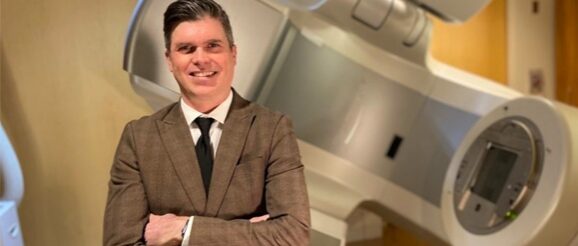Dal prof receives Governor General’s Innovation Award for 3D printed devices that improve cancer treatment

For many cancer patients, going through radiation therapy can be incredibly stressful and time-consuming. Dr. James Robar was determined to find a better way and several years ago hatched an idea to use 3D printing technology to do so.
His underlying vision was straightforward: create software that would allow treatment facilities anywhere in the world to print out personalized treatment accessories for patients in a matter of seconds.
While hospitals and treatment centres had long used such accessories, usually thin pieces of plastic called boluses or boli, the software Dr. Robar designed has the power to produce better ones that fit the particular contours of individual patients’ bodies — thereby improving the accuracy and quality of treatment and the overall patient experience.
The unique software is now being deployed by Adaptiiv Medical Technologies Incorporated at leading cancer centres worldwide.
Dr. Robar, co-founder and chief science officer at the rapidly growing Halifax-based firm as well as a professor and chief of Medical Physics in Dal’s Faculty of Medicine, received Canada’s highest honour for innovation this week in recognition for his work on the technology.
He was one of six 2021 Governor General’s Innovation Award recipients announced by the Rideau Hall Foundation Tuesday.
“Receiving the Governor General’s Innovation Award is a thrill and a career highlight,” says Dr. Robar. “For me it is a reminder of the aspects of my career that I value the most. I’ve been privileged to work at the front lines of health care where one can identify difficult problems that really affect patients.”
The 2021 award recipients will be celebrated at a virtual ceremony on May 20, 2021, during Canadian Innovation Week. Dr. Robar was nominated for the award by the Discovery Centre.
A better way
Launched in 2016, the Governor General’s Innovation Awards inspire Canadians to embrace innovation and to emulate innovative, entrepreneurial risk-takers who have developed new or better ways of creating value and who are having a meaningful impact on our quality of life. Each year, up to six award winners are identified through a two-stage, merit-based selection process.
“Congratulations to Dr. Robar on this richly deserved recognition from Rideau Hall,” says Alice Aiken, vice president research and innovation at Dalhousie. “His innovative 3D-printed devices for patients are changing the way cancer is treated around the world and have significantly improved the patient experience.”
David Anderson, dean in the Faculty of Medicine, says the award is a well-deserved honour for the medical physicist.
“The Faculty of Medicine is immensely proud to celebrate this recognition of Dr. Robar’s leading-edge work in medical physics,” says Dr. Anderson. “Through research, teaching, and clinical application, Dr. Robar has helped develop innovative techniques that have contributed to better patient care not only in Nova Scotia, but around the world, proof that Dalhousie’s and Nova Scotia Health’s experts are among the world’s most creative and dynamic innovators. Dr. Robar has dedicated his career to helping improve the lives of patients undergoing radiation therapy, and I join many in congratulating him on receiving this well-deserved honour.”
A third dimension of innovation
Dr. Robar’s technology is used in the treatment of skin, breast, head/neck and gynecological cancers and integrates with clinician treatment planning systems.
As 3D printing continues to become more and more accessible by the day, so, too, does Dr. Robar’s technology.
Over the course of his career, Dr. Robar has pioneered multiple advancements improving imaging and treatment delivery for radiotherapy. These technologies include enhanced imaging to improve the accuracy of targeting tumours with radiation, hardware, and software detecting sub-millimetre motion of patients to improve the precision of treatment, and planning algorithms to provide improved sparing of healthy tissues and organs.
“I’ve had the opportunity to work with top-calibre students in the Dal Medical Physics graduate programs to solve these problems. I’ve enjoyed becoming an entrepreneur and the journey of spinning out a company along with talented co-founders. It’s an honour — but above all, this award makes me feel fortunate to have had these experiences.”
With files from Matt Reeder, Jennifer Lewandowski and Jason Bremner
Learn more: Governor General’s Innovation Awards
